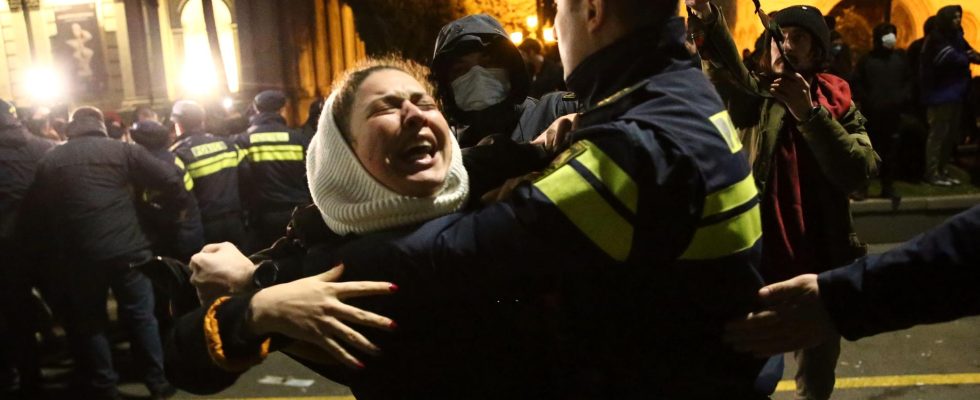By: Mia Holmberg Karlsson/TT
Published: Less than 20 min ago
1 of 3 Photo: Zurab Tsertsvadze/AP/TT
Is NATO and EU aspirant Georgia putting the dream of Brussels on the shelf?
Georgia’s “Kremlin-inspired” spying bill, now said to have been withdrawn, is raising fears that Tbilisi is increasingly turning its sights on Moscow.
– It may happen that people think that the EU makes unreasonable demands, that they might as well approach Russia instead, says Jakob Hedenskog, analyst at the Center for Eastern European Studies at the Institute for Foreign Policy.
During the week, dramatic scenes unfolded outside the parliament in Tbilisi, where protesters were met with tear gas, pepper spray and water cannons as they protested the controversial bill. In the text of the law, it was stated that organizations that are financed to more than 20 percent by foreign money must register as “foreign agents” – or be punished with heavy fines.
On Thursday, it was suddenly announced that the bill was being withdrawn. But the government’s statement leaves question marks.
“When the emotional situation settles down, we should better explain to the public what the law was for, and why it was important to ensure transparency regarding foreign influence in our country,” reads the statement from the ruling Georgian Dream party, which believes that the bill was misrepresented as a “Russian law”.
Curb democracy?
From the opposition’s side, the law was seen as precisely a way to get closer to Russia and alienate itself from Europe, according to Jakob Hedenskog. Critics have pointed out that the proposal was a pure copy of the Russian law that since 2012 has severely restricted journalists and democratic institutions in the neighboring country to the north.
– In Russia, the law has become more and more draconian and basically made all opposition illegal, he says.
According to Jakob Hedenskog, the proposal was just the latest in a series of government measures aimed at curtailing democracy in Georgia. The former Soviet state – which was invaded in 2008 by Russia, which then occupied the breakaway provinces of South Ossetia and Abkhazia – seems increasingly to be running the Kremlin’s affairs.
Sanctions are countered
The ruling Georgian Dream party was founded by the Georgian oligarch Bidzina Ivanishvili who made his fortune in Russia.
– He stays in the background, but in practice he controls the party and maybe the whole country, and tries to push Georgia in a more pro-Russian direction, says Hedenskog.
Above all, it means increasingly embracing the church and its conservative agenda, with strong opposition to the LGBTQ movement and anything deemed to threaten “traditional values”.
But since the invasion of Ukraine just over a year ago, Georgia has also increasingly turned against Moscow and has also actively countered Western sanctions against Russia.
– On the one hand, they have not jumped on the sanctions, on the other hand there are indications that Russia is using Georgia to circumvent the sanctions and that the government in Tbilisi is allowing it to happen, says Jakob Hedenskog.
– The Georgian government has not stood up for Ukraine – despite the fact that Russia in practice also occupies Georgian territory.
Draws parallels to the Maidan
In early 2022, Georgia, Ukraine and Moldova applied for EU membership. A few months later, it was announced that Ukraine and Moldova had received candidate status – but not Georgia, as the country first needed to implement a series of reforms. According to Jakob Hedenskog, the now withdrawn bill directly countered the policy that the country should pursue in order to step out of the EU’s waiting room.
At the same time, a majority of the population is against Russia’s war and around 80 percent support EU membership. This week’s violent demonstrations lead Jakob Hedenskog to draw parallels to the revolt in Ukraine in 2013–2014. Then Independence Square (Maidan) in Kiev was rocked by deadly protests as the population turned against pro-Russian President Viktor Yanukovych.
– Is Georgia facing some sort of Maidan, a Ukrainian scenario? Is it a Yanukovych moment we are seeing? Things can happen very quickly – the regime can lose control, which is what happened in Ukraine.
Facts
The conflict in Georgia
On August 8, 2008, tensions between the government in Tbilisi and separatists in the region of South Ossetia escalated to war. Russia intervened on the side of the separatists and advanced far into Georgia before an EU-brokered ceasefire took effect five days after the outbreak of war.
At the same time, separatists in the region of Abkhazia took the opportunity to drive out Georgian forces with Russian help. Both South Ossetia and Abkhazia declared independence after the war and were quickly recognized by Russia.
According to the 2008 agreement, all parties were to withdraw to the positions they held before the war. However, Russia still has thousands of troops stationed in South Ossetia and Abkhazia, and over time has increased its influence over the economy and politics of the breakaway republics.
The five-day war against Russia in 2008 is said to have been partly due to Georgia’s ambition to become a member of the NATO defense alliance. With the war, Western support for Georgia cooled and NATO membership was postponed. Russia’s attack on Ukraine in 2022 has fueled Georgian ambitions to seek EU membership.
Sources: EUMM, Amnesty International, MSB, Landguiden/UI
Read more
